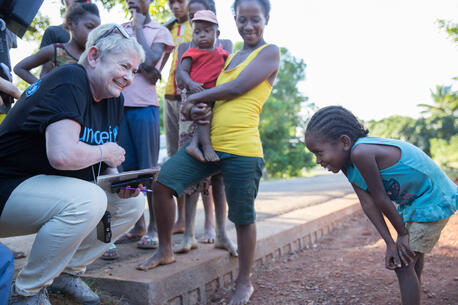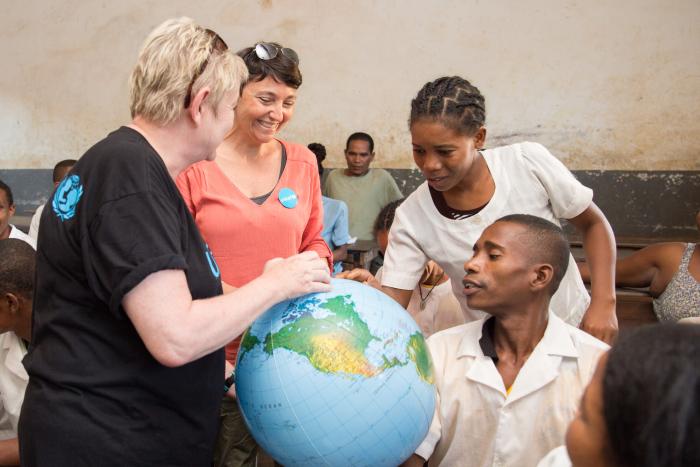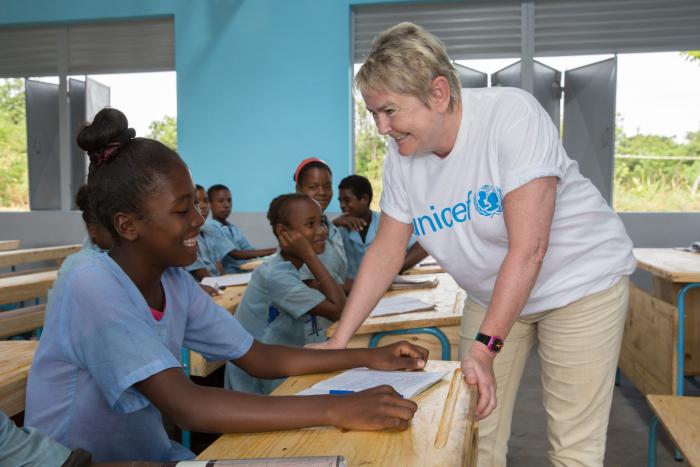
Reflections from the Field: Daily Challenges Face Girls in Madagascar
Zonta International and UNICEF USA Partner to Support Let Us Learn Madagascar
In May this year, I went to Madagascar to participate in a visit to UNICEF Madagascar and the Let Us Learn program. Zonta International has committed to support Let Us Learn Madagascar in partnership with UNICEF USA for the 2016-2018 biennium.
Though I have traveled to many countries, Madagascar was new and different; two clear standouts for me were that the nature is fantastic and diverse, and that you still can feel the influence from French colonial rule. But what struck me above all was the poverty; many families live on only US$2 a day or less. Violence is frequent and young girls are especially targeted. It is one of the most cyclone-prone countries in the world and there is a high vulnerability to climate change.
Additionally, access to education, which many of us often take for granted, is stymied, and a service that should be free of charge is not. Many villages pay for their own teachers in schools– a cost that is significant for a poor family.

Sonja Hönig Schough and Sophie Achileas (chief education in UNICEF), discussing with the teachers in the junior secondary school of Marofarihy - Vatovavy Fitovinany Region ©UNICEF Madagascar/2017/AbelaRalaivita
One day I met with four young teenage girls who told me about their dreams. Two wanted to be midwives, one wanted to be a doctor and the last one a police officer. They all dreamt and talked about a better future for themselves and for their families.
We were in a classroom without lights, as so many are in Madagascar, and even though it was not later than 4:30 p.m., it started to be very dark in the room. One of the girls told us how much better it was with the solar lamp she was able to rent for her home; with it she could do her homework when she got home and hopefully get better grades. This put into context for me the fact that electricity seldom exists in people’s homes and schools. As a result, many of the children walk home in complete darkness, some of them as far as 5 km. Again, services we take for granted but that have a significant impact on a girls’ safety, studies, and future opportunities.
Nonetheless, I was impressed by these young girls and their drive, and this conversation reinforced my belief that they and their fellow sisters need all the support we can give them. They are the future.

Sonja Hönig Schough, president of Zonta international, discussing with a girl in the junior secondary school of Marofarihy - Vatovavy Fitovinany Region. ©UNICEF Madagascar/2017/AbelaRalaivita
Girls must have the possibility to continue their studies and not stop at the lower levels. Every extra year a girl attends school increases her possibility for an income and self-sustainability. It also delays early marriages and early pregnancies. Education is an important key to development for the individual, but also for the society.
What I like especially with Let Us Learn is that it is an integrated program. It is not enough just to get the children to school. The schools must also be built in such a way that they are safe from natural disasters like cyclones and even more importantly, child friendly and free from the threat of violence. The teachers must be trained so they may deliver a quality education. There must be separate and safe latrines and handwashing stations so girls do not drop out in their early teens.
Zonta International has been a partner to UNICEF USA for more than 40 years and I am convinced the Let Us Learn project will be added to our list of success stories together.
Let Us Learn is a UNICEF initiative that was launched in 2011 to bring innovative educational opportunities to the world’s most vulnerable children. Let Us Learn addresses inequities in education by reaching out-of-school children, expanding girls’ education and improving the quality of education. Five countries — Afghanistan, Bangladesh, Liberia, Madagascar and Nepal – are targeting the most vulnerable children by sharpening the equity focus in both programming and monitoring of results. To date, this program has made great strides to ensure that over 1 million of the world’s most marginalized and underprivileged children have access to quality education.
For the 2016-2018 biennium, Zonta International has committed to supporting Let Us Learn in Madagascar.
HOW TO HELP
There are many ways to make a difference
War, famine, poverty, natural disasters — threats to the world's children keep coming. But UNICEF won't stop working to keep children healthy and safe.
UNICEF works in over 190 countries and territories — more places than any other children's organization. UNICEF has the world's largest humanitarian warehouse and, when disaster strikes, can get supplies almost anywhere within 72 hours. Constantly innovating, always advocating for a better world for children, UNICEF works to ensure that every child can grow up healthy, educated, protected and respected.
Would you like to help give all children the opportunity to reach their full potential? There are many ways to get involved.





